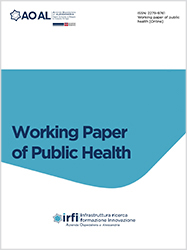Valutazione prognostica delle mutazioni di KRAS e BRAF in relazione allo stato delle proteine del Mismatch Repair: analisi preliminare di sopravvivenza dei pazienti con adenocarcinoma colorettale
All claims expressed in this article are solely those of the authors and do not necessarily represent those of their affiliated organizations, or those of the publisher, the editors and the reviewers. Any product that may be evaluated in this article or claim that may be made by its manufacturer is not guaranteed or endorsed by the publisher.
Autori
Obiettivi: l’impatto prognostico delle mutazioni nei geni BRAF e KRAS nei pazienti con tumore del colon-retto è stato valutato per individuare le variazioni di sopravvivenza tra i pazienti con queste mutazioni, in relazione alle diverse caratteristiche morfologiche identificate alla diagnosi ed all’espressione delle proteine di Mismatch Repair. Lo scopo finale del progetto sarà quello di stabilire modelli per prevedere le variazioni di sopravvivenza in diversi sottoinsiemi di pazienti con tumore del colon-retto. Materiali e Metodi: sono state condotte analisi di sopravvivenza parziale su 32 soggetti in relazione a tre diverse variabili: mutazione nei geni BRAF o KRAS, espressione delle proteine dei Mismatch Repair e caratteristiche morfologiche del tumore. Risultati: i risultati preliminari di questo studio dimostrano che la sopravvivenza in diverse sottopopolazioni di pazienti con tumore del colon-retto può essere influenzata da diversi fattori, che includono, oltre alle indagini immunoistochimiche e molecolari, la valutazione di diverse caratteristiche morfologiche. Conclusioni: l’integrazione di diverse caratteristiche può rivelare quali fattori abbiano un impatto più significativo sulla sopravvivenza in questi sottogruppi. Sarà necessario un numero maggiore di pazienti per progettare diversi modelli di sopravvivenza e verificare in maniera più efficace questi risultati preliminari.
Come citare

Questo volume è pubblicato con la licenza Creative Commons Attribuzione - Non commerciale 4.0 Internazionale.






